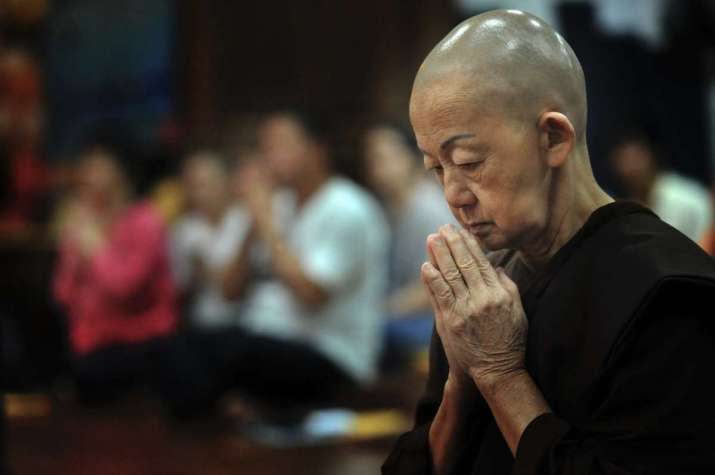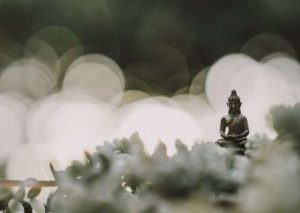
Kinds of friends
There are four types of friends: first come friends with whom one dines and drinks and talks nonsense, loudly laughing and joking, while seeking sensual pleasures. Second come friends with whom one derives profit for personal gain. Third are friends whom one can trust under any circumstances. Fourth are friends with whom one talks purely about the Dhamma.
What kind of friend are you?
Kinds of speech
One needs to be careful about what one hears and says: first comes the kind of talk one hears when people are sitting around, eating and drinking, using low, coarse, loud, aggressive, abusive, sexually explicit language. Second is speech one hears when people gossip about others, complaining how others are selfish and greedy and how it is always somebody else’s fault. Third is talk about celebrities, news, wars, governments, politicians, corruption, greed, oppression, death, and destruction. Fourth is talk about wise, energetic mental development in the practice of the Dhamma.
What kind of speech is most usual for you?
Kinds of actions
One must be mindful of four kinds of actions, paying heed that the consequences of one’s actions are wholesome and beneficial. First come actions which satisfy personal needs, like grasping for love or attention or seeking name, fame and fortune or fulfillment of sensual satisfaction. Second are actions performed for profit, either for the sake of satisfying worldly greed or for profitable development honing skills of understanding, knowledge, equanimity, purity, peace and wisdom. Third are wise actions bringing profitable results in our own development and which also benefit others within the community or the wider world. Fourth come internally concentrated actions, energetically focussed on the path to purification, clearing and refining the mind and leading to liberation.
What are your habitual actions?
The Buddha described four kinds of yokes which restrain freedom:
Monks, there are these four yokes. Which four?
The yoke of sensuality, the yoke of becoming, the yoke of views, and the yoke of ignorance.
And what is the yoke of sensuality? There is the case where a certain person does not discern, as it actually is present, the origination, the passing away, the allure, the drawbacks, and the escape from sensuality. When he does not discern, as it actually is present, the origination, the passing away, the allure, the drawbacks, and the escape from sensuality, then—with regard to sensual objects—he is obsessed with sensual passion, sensual delight, sensual attraction, sensual infatuation, sensual thirst, sensual fever, sensual fascination, sensual craving. This is the yoke of sensuality.
And how is there the yoke of becoming? There is the case where a certain person does not discern, as it actually is present, the origination, the passing away, the allure, the drawbacks, and the escape from becoming. When he does not discern, as it actually is present, the origination, the passing away, the allure, the drawbacks, and the escape from becoming, then—with regard to states of becoming—he is obsessed with becoming-passion, becoming-delight, becoming-attraction, becoming-infatuation, becoming-thirst, becoming-fever, becoming-fascination, becoming-craving. This is the yoke of sensuality and the yoke of becoming.
And how is there the yoke of views? There is the case where a certain person does not discern, as it actually is present, the origination, the passing away, the allure, the drawbacks, and the escape from views. When he does not discern, as it actually is present, the origination, the passing away, the allure, the drawbacks, and the escape from views, then—with regard to views—he is obsessed with view-passion, view-delight, view-attraction, view-infatuation, view-thirst, view-fever, view-fascination, view-craving. This is the yoke of sensuality, the yoke of becoming, and the yoke of views.
And how is there the yoke of ignorance? There is the case where a certain person does not discern, as it actually is present, the origination, the passing away, the allure, the drawbacks, and the escape from the six sense media. When he does not discern, as it actually is present, the origination, the passing away, the allure, the drawbacks, and the escape from the six sense media, then—with regard to ignorance concerning the six sense media—he is obsessed with not-knowing. This is the yoke of sensuality, the yoke of becoming, the yoke of views, and the yoke of ignorance.
Conjoined with evil, unskillful mental qualities—defiling, leading to further becoming, unhappy, resulting in suffering and stress, and in future birth, aging, and death—one is said not to be at rest from the yoke.
These are the four yokes.
Now, there are these four unyokings. Which four? Unyoking from sensuality, unyoking from becoming, unyoking from views, and unyoking from ignorance.
And what is unyoking from sensuality? There is the case where a certain person discerns, as it actually is present, the origination, the passing away, the allure, the drawbacks, and the escape from sensuality. When he discerns, as it actually is present, the origination, the passing away, the allure, the drawbacks, and the escape from sensuality, then—with regard to sensual objects—he is not obsessed with sensual passion, sensual delight, sensual attraction, sensual infatuation, sensual thirst, sensual fever, sensual fascination, sensual craving. This is unyoking from sensuality.
And how is there unyoking from becoming? There is the case where a certain person discerns, as it actually is present, the origination, the passing away, the allure, the drawbacks, and the escape from becoming. When he discerns, as it actually is present, the origination, the passing away, the allure, the drawbacks, and the escape from becoming, then—with regard to states of becoming—he is not obsessed with becoming-passion, becoming-delight, becoming-attraction, becoming-infatuation, becoming-thirst, becoming-fever, becoming-fascination, becoming-craving. This is unyoking from sensuality and unyoking from becoming.
And how is there unyoking from views? There is the case where a certain person discerns, as it actually is present, the origination, the passing away, the allure, the drawbacks, and the escape from views. When he discerns, as it actually is present, the origination, the passing away, the allure, the drawbacks, and the escape from views, then—with regard to views—he is not obsessed with view-passion, view-delight, view-attraction, view-infatuation, view-thirst, view-fever, view-fascination, view-craving. This is unyoking from sensuality, unyoking from becoming, and unyoking from views.
And how is there unyoking from ignorance? There is the case where a certain person discerns, as it actually is present, the origination, the passing away, the allure, the drawbacks, and the escape from the six sense media. When he discerns, as it actually is present, the origination, the passing away, the allure, the drawbacks, and the escape from the six sense media, then—with regard to ignorance concerning the six sense media—he is not obsessed with not-knowing. This is unyoking from sensuality, unyoking from becoming, unyoking from views, and unyoking from ignorance.
Disjoined from evil, unskillful mental qualities—defiling, leading to further becoming, unhappy, resulting in suffering and stress, and in future birth, aging, and death—one is said to be at rest from the yoke. (AN 4.10; translation Bhikkhu Thanissaro)
Which kinds of yokes yoke you?
References
Yoga Sutta: Yokes, translated from the Pali by Thanissaro Bhikkhu (Access to Insight)












